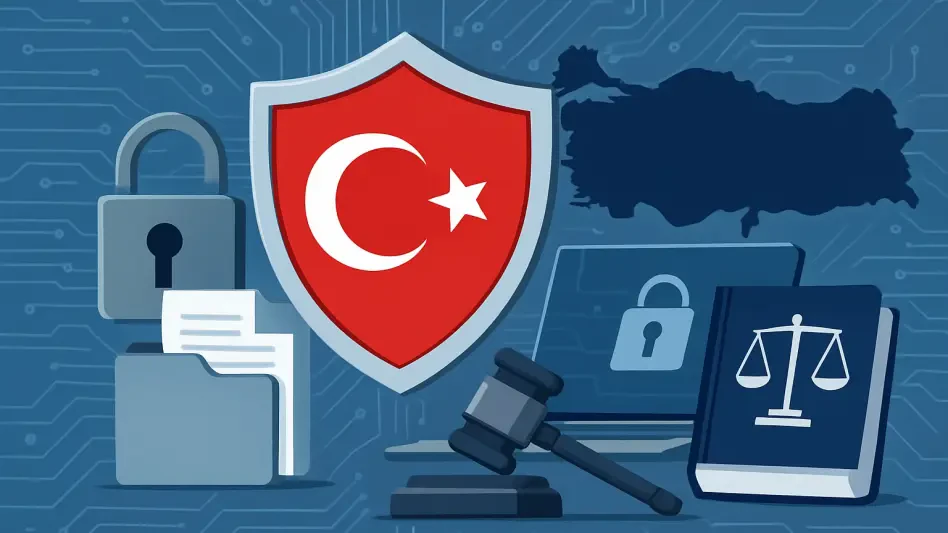In an era where digital threats loom larger than ever, Turkey has taken a bold step forward with a groundbreaking cybersecurity law enacted in March of this year, designed to fortify the nation’s digital defenses and protect everyone navigating the online world. This regulation is not merely a set of technical guidelines but a comprehensive strategy that intertwines personal privacy, business operations, and national security into a cohesive framework. With cyberattacks becoming more sophisticated—ranging from data breaches affecting millions to targeted strikes on critical infrastructure—this law arrives at a critical juncture. It aims to create a safer cyberspace for individuals scrolling through social media, companies managing sensitive data, and government entities safeguarding essential services. Understanding the implications of this legislation is vital, as it touches on various facets of daily life in a country with 93.3 million mobile subscribers and an average of 7.5 hours spent online each day. This article delves into the core components of the law, exploring how it impacts different segments of society and what responsibilities it places on everyone in this increasingly connected landscape.
Unpacking the Foundation of the New Regulation
Turkey’s latest cybersecurity law marks a significant shift by embedding digital protection within the broader context of national security. Encompassing a wide array of sectors, the legislation seeks to shield critical infrastructure such as energy grids and healthcare systems, alongside personal data shared across digital platforms. This holistic approach reflects a global recognition that cyber threats can disrupt not just individual lives but entire economies. A key pillar of the law is the creation of the Cybersecurity Presidency, a centralized authority tasked with overseeing compliance, monitoring emerging threats, and coordinating rapid responses to incidents. This body acts as a unifying force, addressing past challenges of fragmented oversight among various institutions. For the average person, this translates to a more structured and secure digital environment, albeit with new obligations to adhere to safety protocols.
Beyond establishing a central authority, the law sets forth stringent guidelines that apply to public and private entities alike. It mandates proactive measures like vulnerability assessments and incident reporting to preempt and mitigate risks. This is particularly significant given the scale of digital activity in Turkey, where high internet penetration rates expose vast amounts of data to potential exploitation. By prioritizing prevention over reaction, the regulation aims to build resilience against threats ranging from state-sponsored cyber warfare to individual hacking attempts. The emphasis on a unified framework also aligns with international trends, drawing inspiration from robust systems like the European Union’s data protection regulations, ensuring that Turkey remains competitive and secure on the global stage.
Personal Implications in a Digital Age
For individuals, the implications of this cybersecurity law are both reassuring and demanding. At its core, the legislation strives to protect personal information from unauthorized access and misuse, a pressing concern in a nation where millions engage online daily. With mobile broadband usage soaring and data consumption averaging 16.7 GB per month per subscriber, the risk of breaches impacting personal identities or financial details is substantial. Under this law, enhanced privacy measures are expected to reduce such vulnerabilities, offering greater peace of mind when sharing information on social platforms or conducting transactions. This protective layer is a direct response to the evolving nature of cybercrime, which often targets unsuspecting users through phishing schemes or malware.
Moreover, the law introduces initiatives to foster a cybersecurity culture through public education and awareness programs. These efforts aim to equip individuals with the knowledge to navigate the digital world safely, whether by recognizing fraudulent emails or adopting stronger password practices. This educational focus underscores the understanding that technology alone cannot combat cyber threats; human behavior plays a crucial role. As these programs roll out, expect to encounter campaigns or resources designed to enhance digital literacy, empowering everyone to contribute to a safer online ecosystem. This dual approach of protection and education signals a long-term vision for reducing personal exposure to digital risks.
Business Responsibilities and Challenges
Businesses operating in Turkey face a new era of accountability under this cybersecurity law, with significant requirements that could reshape operational strategies. Companies, regardless of size, are now obligated to implement robust security measures to safeguard data and systems, alongside mandatory reporting of any cyber incidents. Failure to comply can result in severe financial penalties, with fines reaching up to 100 million Turkish lira, not to mention potential criminal consequences for negligence. This places a substantial burden on organizations to invest in advanced security infrastructure and train employees to recognize and respond to threats. For many, this may involve overhauling existing protocols to meet the stringent standards set forth by the legislation.
Another noteworthy aspect is the push for domestically developed cybersecurity solutions, reflecting a national priority to reduce reliance on foreign technology. While this could stimulate local innovation and economic growth, it presents challenges for businesses accustomed to international tools and platforms. Adapting to homegrown systems might entail additional costs or compatibility issues, particularly for multinational firms. Nevertheless, this policy underscores a strategic intent to enhance technological sovereignty, mirroring approaches seen in other nations prioritizing self-reliance. Businesses must navigate this transition carefully, balancing compliance with operational efficiency, to avoid disruptions while aligning with the law’s objectives.
Safeguarding Critical Infrastructure
The protection of critical infrastructure stands as a cornerstone of Turkey’s cybersecurity law, targeting sectors like energy, finance, and healthcare that underpin societal stability. These areas are deemed vital due to the catastrophic consequences a cyberattack could unleash—imagine a power grid failure or a hospital system breach during a crisis. The legislation mandates rigorous standards, including regular risk assessments and audits, to ensure these systems remain resilient against digital threats. For employees and stakeholders in such sectors, this translates to heightened scrutiny and the need for constant vigilance to maintain compliance with the law’s strict requirements.
Additionally, the establishment of Cyber Incident Response Teams (CIRTs) under the Cybersecurity Presidency enhances the capacity to address threats swiftly in these critical domains. These teams are designed to provide immediate support during a cyber crisis, minimizing damage and ensuring continuity of essential services. This proactive stance is crucial in an era where state-sponsored attacks and hybrid warfare tactics increasingly target infrastructure as a means of disruption. By prioritizing prevention and rapid response, the law aims to fortify national defenses, ensuring that disruptions to key services are mitigated before they escalate into broader crises affecting the public at large.
Enforcement and Consequences of Non-Compliance
A striking feature of Turkey’s cybersecurity law is its rigorous enforcement mechanism, designed to deter cybercrime through severe penalties. Individuals or entities engaging in illicit online activities—such as hacking, data theft, or disseminating false information about breaches—face harsh repercussions, including imprisonment ranging from one to 15 years. Fines are equally daunting, especially for attacks targeting national infrastructure or those orchestrated by organized groups. This uncompromising stance sends a clear message that digital offenses will face significant consequences, aligning with global trends of escalating penalties to combat sophisticated cyber threats.
Beyond punishing offenders, the law emphasizes accountability across all levels of society. Even those not directly involved in criminal acts must adhere to cybersecurity protocols, whether in personal data handling or workplace practices. Non-compliance, even if unintentional, can lead to administrative sanctions, particularly for organizations failing to meet security benchmarks. This culture of responsibility ensures that everyone has a stake in maintaining a secure digital environment. The punitive framework, while stringent, is intended to foster a proactive approach, encouraging compliance through the specter of substantial legal and financial ramifications rather than relying solely on reactive measures.
Striking a Balance Between Security and Privacy
While Turkey’s cybersecurity law grants extensive powers to the Cybersecurity Presidency for monitoring and intervention, it also incorporates mechanisms to safeguard individual rights. The authority to conduct audits, perform searches, and seize data during investigations is tempered by requirements for judicial approval, ensuring oversight and preventing potential overreach. Data retention, limited to a maximum of two years, further aims to protect privacy by restricting how long sensitive information can be held. These provisions reflect an intent to balance the imperatives of security with the fundamental freedoms of citizens, addressing concerns about surveillance in the digital age.
This equilibrium is critical in maintaining public trust, as overly invasive measures could undermine confidence in the law’s objectives. By aligning with principles seen in international frameworks, such as the emphasis on proportionality and human rights, the legislation seeks to reassure individuals that security enhancements do not come at the expense of personal liberties. This balance is a delicate one, requiring continuous monitoring to ensure that enforcement powers are exercised responsibly. As the law unfolds, its ability to uphold privacy while tackling cyber threats will likely shape public perception and acceptance of these new digital governance structures.
Shaping a Resilient Digital Tomorrow
Reflecting on Turkey’s cybersecurity journey, the enactment of this comprehensive law addressed pressing vulnerabilities that had long threatened the nation’s digital landscape. It tackled the challenges of a rapidly expanding online presence by establishing robust mechanisms for prevention, response, and accountability. The efforts to protect critical infrastructure and personal data demonstrated a commitment to safeguarding societal well-being amidst growing cyber risks. Looking back, the stringent penalties and centralized oversight by the Cybersecurity Presidency set a precedent for deterring digital offenses while fostering a culture of responsibility.
Moving forward, the focus should shift to sustained investment in education and technology to support the law’s ambitious goals. Encouraging public participation through awareness initiatives will be essential to build long-term resilience against cyber threats. Businesses and critical sectors must prioritize ongoing training and innovation, particularly in adopting domestic solutions, to stay ahead of evolving risks. International collaboration also remains a key consideration, as cyber challenges often transcend borders, necessitating shared strategies and resources. Ultimately, the success of this regulation hinges on collective action, ensuring that every stakeholder plays a role in crafting a secure and dynamic digital future for Turkey.








